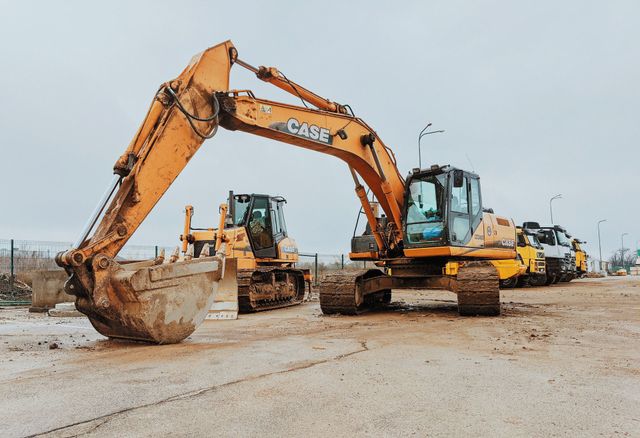Specialist Septic Ohio - Trusted Septic Tank Specialists in Ohio
Specialist Septic Ohio - Trusted Septic Tank Specialists in Ohio
Blog Article
Comprehensive Excavation Approaches: Grasping the Basics for Success
The careful planning, exact execution, and meticulous attention to detail required in excavation jobs demand an extensive method that includes various essential facets. The real proficiency exists not just in recognizing these fundamentals but in seamlessly incorporating them to browse the complexities of excavation projects with skill.
Comprehending Excavation Job Planning

Successful excavation tasks are developed on the structure of comprehensive and precise planning. The first phase of any excavation project is the drawing board, where critical decisions are made that can considerably affect the result of the task. During this phase, it is necessary to collect all pertinent info about the website, including topographical surveys, soil make-up, and any type of prospective hazards that may exist. Recognizing the project scope, budget plan, and timeline restrictions is crucial for producing an extensive excavation plan that guarantees the task's success.
One trick facet of excavation task preparation is the growth of a thorough timeline that lays out the series of milestones, due dates, and tasks. This timeline works as a roadmap for the task group, permitting them to track progression and make essential changes to make certain the task remains on timetable. Additionally, a distinct budget that represents all expenditures, including devices rental, labor expenses, and products, is essential for avoiding cost overruns and delays. By very carefully considering all these elements throughout the planning phase, excavation tasks can be implemented effectively and properly, resulting in successful end results.
Dirt Analysis and Site Analysis
Conducting complete dirt analysis and site analysis is an important action in the preparation phase of any type of excavation task. Soil analysis includes figuring out the composition, structure, and buildings of the soil at the excavation website. This details is essential for recognizing the dirt's bearing capacity, wetness content, and capacity for disintegration, which are vital aspects in determining the excavation techniques and equipment required for the project.
Site evaluation exceeds soil evaluation and encompasses a more comprehensive evaluation of the general website problems. This evaluation consists of identifying any kind of potential dangers, such as below ground energies, environmental issues, or unsteady terrain, that might impact the excavation process. By thoroughly assessing the site, job managers can develop effective excavation strategies that focus on safety and security, performance, and environmental management.
Utilizing advanced technologies like ground-penetrating radar, soil tasting, and drone studies can boost the precision and effectiveness of soil evaluation and website analysis. Spending time and sources in these initial steps can eventually conserve time and avoid expensive hold-ups or difficulties during the excavation procedure.
Tools Selection and Use
Reliable excavation jobs depend greatly on calculated tools selection and use to make sure ideal efficiency and productivity. Picking the appropriate tools for the work is critical in maximizing performance and decreasing downtime. Elements such as the kind of dirt, depth of excavation, and project extent play a significant function in determining the most appropriate devices for the job available.

Along with selecting the suitable devices, appropriate application you can try this out is key to job success. Operators needs to be educated to take care of the equipment safely and effectively - septic ohio. Regular maintenance checks and prompt repair work assist stop failures and make certain consistent performance throughout the project
Precaution and Regulations Conformity
In the world of excavation tasks, focusing on precaution and compliance with regulations is critical to making sure a lawfully audio and secure operational atmosphere. Precaution encompass a variety of practices, consisting of carrying out extensive website assessments, applying correct signage and obstacles, and supplying adequate safety and security training for all workers associated with the excavation process. Adherence to laws, such as OSHA needs in the United States, ensures that the excavation task satisfies the required standards to shield employees, onlookers, and the surrounding setting.

Tracking Progress and Adjusting Strategies
How can project supervisors effectively track the advancement of excavation tasks and adjust their techniques accordingly to maximize end results? Tracking development is vital for guaranteeing that excavation jobs remain on track and fulfill target dates. Job managers can utilize different devices and techniques to track development, such as everyday report card, normal site inspections, and progressed tracking technologies like drones and general practitioners tracking systems. By constantly keeping an eye on the project's innovation, managers can determine any potential hold-ups or problems early on and take aggressive procedures to address them.

Final Thought
To conclude, mastering the fundamentals of comprehensive excavation strategies is important for the success of any task. By comprehending job preparation, examining soil and site conditions, picking appropriate devices, abiding by safety laws, and keeping track of progression, project supervisors can guarantee a smooth and efficient excavation process. Applying these techniques will certainly result in effective results and decrease prospective threats or problems throughout the excavation project.
The preliminary stage of any type of excavation task is the planning phase, where essential choices are made that can considerably influence the outcome of the project. Comprehending the project budget, scope, and timeline constraints is vital for creating an extensive excavation strategy that makes certain the job's success.
Just how can project managers successfully track the advancement of excavation jobs and adapt their methods as my website necessary to optimize outcomes? By closely checking progress and being prepared to adjust strategies, job supervisors can enhance the overall success of excavation jobs.
By recognizing task planning, analyzing soil and website conditions, picking appropriate devices, conforming with safety and security policies, and keeping track you could try this out of progression, task supervisors can make certain a efficient and smooth excavation procedure.
Report this page